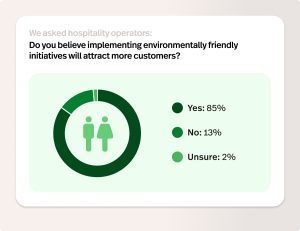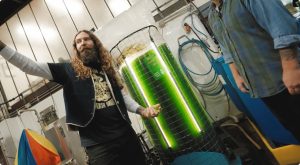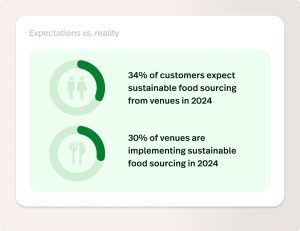
We are living in important times.
The lingering effects of the pandemic where we were reminded that we are not, as a species, invincible has brought into sharp focus the steps needed to safeguard our way of life for future generations.
One such step is creating sustainable ways for us to operate.
Indeed, sustainability is at the forefront of our efforts as shown in Lightspeed’s recent Hospitality Report where sustainable practices ranked 1st and 2nd as priorities for venues and customers respectively.
Read on to learn about how this focus on sustainability gained traction and how sustainable practices are becoming the norm for the hospitality industry.
- The growth and popularity of environmental sustainability
- Current sustainable practices in hospitality venues
- Evaluating worth: assessing the impact of sustainability efforts in the industry
- The future of sustainability in the hospitality industry
2024 Hospitality Insights and Dining Dynamics
Lightspeed has surveyed over 500 hospitality operators and more than 1,000 consumers to show you which dining trends are on the rise in 2024. Download the full report for free today.
The growth and popularity of environmental sustainability
Until relatively recently, sustainability has been somewhat of a niche concept, restricted to those who have spent a lifetime fighting its cause or those with pockets deep enough to shoulder the extra financial burden that comes with simply doing what’s right for our planet.
These two groups don’t often overlap.
But with the ever-increasing regularity of events triggered by global warming, the idea of implementing some sustainable practices into your day-to-day operations became more widespread.
More people began to investigate not just the why behind going sustainable, but the how. Reports in mainstream media became further reaching and enjoyed a larger impact on consumers than they had before.
And with louder voices from consumers ringing in hospitality operator’s ears, there was no choice but to listen and act on their calls to do better.
Indeed, sustainable practices are now viewed as a major means to attract more customers, as illustrated in Lightspeed’s recent Hospitality Report where results showed that 85% of hospitality operators believe implementing environmentally friendly initiatives will attract more customers.

So, what exactly do these practices look like?
Current sustainable practices in hospitality venues
This is where the recent rise in popularity of sustainability becomes a double-edged sword of sorts.
There are no shortage of options when it comes to going green and these options span every sector of your operations. And therein lies the rub: with so many green initiatives to choose from, things can get overwhelming.
Here are a few that you could consider.
Going paperless
In the hospitality industry, there is a lot of paper. It’s understandable. Paper is literal, physical traceability in your hands.
Missing meal from an order? Check the dockets. Wrong type of oil in your delivery? Check the invoice. A customer needs to write off a work lunch? Here’s your receipt.
It all adds up.
Implementing paperless solutions in your venues can drastically reduce your carbon footprint, not to mention the savings on your stationery bills.
A Kitchen Display System (KDS) can digitise your ordering workflows, replacing paper dockets with a screen showing the same information. They’re also quicker to use and easier to make any adjustments on as there’s no more waiting for dockets to print, it all comes straight from your POS.
Recyclable or reusable cutlery & packaging
This is something more suited to a quick service restaurant or a cafe, but replacing your packaging with greener alternatives is a great way to push towards a more sustainable operation.
Ask your packaging suppliers about any products made from recycled and recyclable materials. Think paper straws, wooden cutlery and any biodegradable products.
It’s also common practice to encourage takeaway coffee drinkers to bring their own reusable cups with a discount. This typically hovers around the 50c mark, but it saves on your packaging bill whilst also having the dual benefit of garnering some goodwill with your customers.
Seasonal & farm to table ingredients
The dark horse of sustainable practices, letting the seasons dictate your menu is often forgotten in favour of more obvious sustainable options. Don’t let a lack of knowledge become your pitfall.
Because the growing conditions occur naturally there’s no need for any excess watering or artificial lighting to help it grow. And as the seasons bring with them new things, so too do they take away the old. At the end of each season, the soil is allowed to rejuvenate, ready to give again the next time around.
These ingredients are also rarely imported, meaning less distance to travel, less time in transit and less fuel used.
Wastage
Wastage is everything when it comes to sustainability.
Cutting down on your wastage sees less food going into the trash, it sees less ingredients being ordered, prep time is cut without having to make excess food which, in turn, saves on energy used by the kitchen equipment it’s made on, all of which saves you money every step of the way, making your business both environmentally and financially more sustainable.
Track your waste.
“The acumen of yield”
At our recent Table Talks event, Attica General Manager, Claire Stenhouse, shed some light on Attica’s approach to wastage:
“One of the things that we focus a lot on is the acumen of yield. Our chefs work in collaboration with everyone that we have in the business to make sure that the yield of any given product is being utilised in every different kind of way.
“So for example, the tomatoes that we have at the moment, anything left over from that will either go into the bolognese for lasagna, or our bartenders will clarify them and make a kick ass bloody martini.”
Evaluating worth: assessing the impact of sustainability efforts in the industry.
So, how have these practices worked out and are there any hills yet to climb on our journey to a more sustainable industry?
One idea that has emerged is a collaboration with consumers, venues and their customers working together towards a common goal.
“…a bunch of local investors get to invest in a local business going greener”
This is illustrated to perfection by Sydney brewery Young Henrys.
Along with their incredible Algae Project, their Newtown brewery is 100% powered via the solar panels on their roof. These solar panels were funded by pledges from their customers, securing the first round of funding in just 9 minutes.

Young Henrys Director & Co-founder, Oscar McMahon talked us through the details:
“We buy solar power back from local investors at a fixed rate of return. Really good deal for us, we didn’t have to spend the money that we didn’t have on putting in the solar. And a bunch of local investors get to invest in a local business going greener. Instead of waiting for legislation, you’re putting some change into the hands of the community which is really cool.”
And it’s not just renewable energy where venues can collaborate with their customers.
“Cows destroy the land so, because of that reason, we don’t serve any animals like that”
Again, Melbourne’s Attica found a way to include their customers in their efforts to use more sustainable ingredients from an unlikely source:
“Cows destroy the land so, because of that reason, we don’t serve any animals like that…so we have our hunter guy that sends us down the byproduct of the fashion industry, and we’ve got something called the Eat The Problem Lasagna, the problem being all these animals that come over to the land with their hoofs and things like this.
“So we’ve got wild boar, venison and buffalo—all prevalent in Australia—but should not be here, so we put them in a pasta. It’s the most sustainable way to solve the problem.”
The future of sustainability in the hospitality industry
The good news is, the future of sustainability looks good.
Our survey results show that customer expectations and venue practices seem to be more or less aligned.

This is a welcome departure from years gone by where the customer sentiment was significantly higher than operator’s efforts and it indicates that the industry is on the right path and that sustainable initiatives are no longer niche, but here to stay and, likely, keep growing.
The growing availability of practices that actually save venues money is also an indicator that sustainability can stick it out. While there are still some areas that come with a premium for going green, the evolving digitisation of the hospitality industry is seeing such premiums offset (at least to a degree) with savings on stationary, packaging, energy bills and food costs.
Can AI be a hero?
The capabilities and applications of AI are also a good indicator that at least some of the heavy lifting when it comes to figuring out how to run more sustainably can be burdened by technology rather than hospitality operators.
With the capabilities of ChatGPT growing by the day (it seems), it is a viable option when laying out the groundwork for going green.
Overall, the industry is on the right track, but it’s a long game to play. The changes can’t be seen instantly, but time has shown us that they will be seen eventually.

News you care about. Tips you can use.
Everything your business needs to grow, delivered straight to your inbox.


